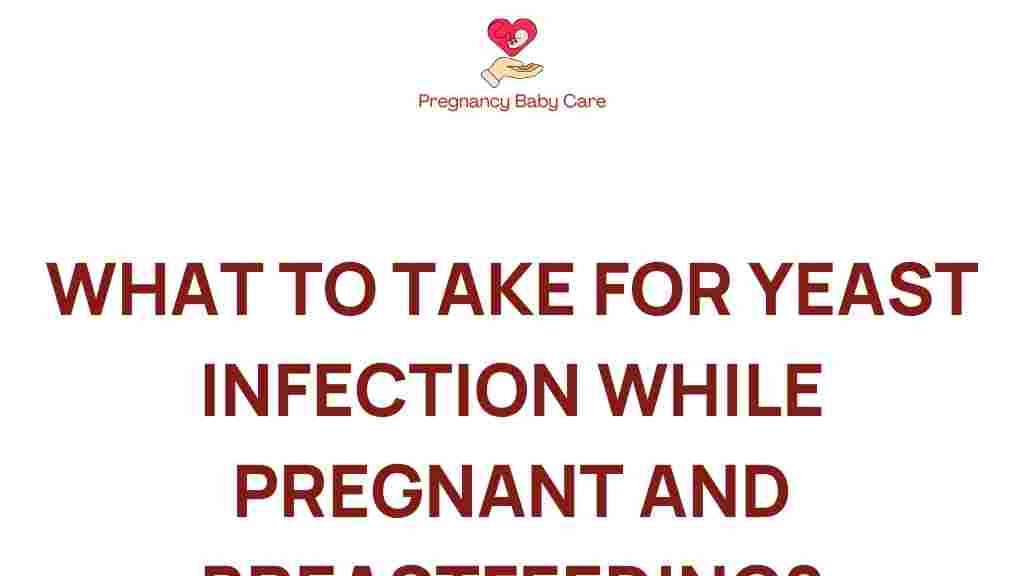Pregnancy and breastfeeding are beautiful and transformative experiences for many women, but they also come with their own set of challenges. One common issue that many mothers face during these times is a yeast infection. Understanding how to navigate yeast infections during pregnancy and breastfeeding is crucial for maternal care and overall health. This article will explore the causes, treatment options, health risks, natural remedies, and safe medications for yeast infections during these critical periods.
Understanding Yeast Infections
A yeast infection, also known as candidiasis, is caused by an overgrowth of the fungus Candida, which naturally resides in the body. During pregnancy, hormonal changes can lead to an increased risk of yeast infections. The symptoms may include:
- Itching and irritation in the vaginal area
- Thick, white vaginal discharge resembling cottage cheese
- Redness and swelling of the vulva
- Pain during intercourse
- Burning sensation during urination
Causes of Yeast Infections During Pregnancy
Several factors can contribute to the development of a yeast infection during pregnancy, including:
- Hormonal Changes: Increased estrogen levels can alter the vaginal environment, promoting yeast growth.
- Antibiotic Use: Antibiotics can disrupt the natural balance of bacteria in the vagina, allowing yeast to thrive.
- Weakened Immune System: Pregnancy naturally suppresses the immune system, making it harder for the body to control yeast levels.
- Diabetes: Uncontrolled diabetes can increase sugar levels in vaginal secretions, feeding the yeast.
Health Risks Associated with Yeast Infections During Pregnancy
While yeast infections are typically not harmful, there are potential health risks to consider:
- Preterm Labor: In rare cases, untreated infections could lead to complications such as premature labor.
- Infection Transmission: A yeast infection can potentially be passed to the baby during delivery, leading to oral thrush.
- Discomfort and Anxiety: The symptoms can cause discomfort and emotional distress for the mother, impacting her overall well-being.
Treatment Options for Yeast Infections During Pregnancy
When treating a yeast infection during pregnancy, it’s essential to consult a healthcare professional to discuss safe options. Here are some common treatment options:
Safe Medications
Some antifungal medications are considered safe during pregnancy:
- Topical Antifungals: Creams or suppositories such as clotrimazole and miconazole are often recommended.
- Oral Medications: Fluconazole is generally avoided in pregnancy, especially in the first trimester, as it may carry risks.
Natural Remedies for Yeast Infections
Many women prefer to explore natural remedies to treat yeast infections during pregnancy. Here are some options:
- Probiotics: Incorporating probiotic-rich foods like yogurt can help restore the natural balance of bacteria.
- Garlic: Known for its antifungal properties, garlic can be consumed or applied topically (diluted).
- Coconut Oil: This has natural antifungal properties and can be applied externally.
- Apple Cider Vinegar: Diluted ACV in a bath may help soothe symptoms.
While these remedies can be beneficial, always consult with a healthcare provider before trying a new treatment.
Maternal Care Tips
Maintaining good maternal care is vital for preventing yeast infections during pregnancy and breastfeeding. Here are some tips:
- Wear Breathable Fabrics: Opt for cotton underwear and avoid tight-fitting clothes to reduce moisture.
- Maintain Good Hygiene: Keep the vaginal area clean and dry. Avoid douching and using scented products.
- Limit Sugar Intake: A diet high in sugar can encourage yeast growth, so aim for a balanced diet.
- Stay Hydrated: Drinking plenty of water helps flush out the system and supports overall health.
Breastfeeding and Yeast Infections
Breastfeeding mothers can also experience yeast infections, particularly in the nipples or breasts, which can lead to discomfort during feeding. Here’s how to manage yeast infections while breastfeeding:
Identifying Symptoms in Breastfeeding Mothers
Symptoms of a yeast infection while breastfeeding may include:
- Itchy or burning sensation on the nipples
- Red or flaky skin on the nipples
- Sharp pain during breastfeeding
- White patches in the baby’s mouth (oral thrush)
Treatment Options for Breastfeeding Mothers
For breastfeeding mothers, treatment options include:
- Topical Antifungals: Creams like clotrimazole can be applied to the affected area.
- Oral Medications: If necessary, antifungal medications can be used, but consult a doctor for safety.
Preventing Yeast Infections While Breastfeeding
To prevent yeast infections during breastfeeding:
- Keep Nipples Dry: After feeding, allow nipples to air dry; avoid moisture accumulation.
- Use Breast Pads: Opt for absorbent, breathable breast pads and change them frequently.
- Practice Good Hygiene: Wash hands and breast pump parts thoroughly to avoid contamination.
Troubleshooting Tips for Yeast Infections
If you suspect a yeast infection, here’s a step-by-step process to troubleshoot:
- Identify Symptoms: Assess if you have any symptoms of a yeast infection.
- Consult a Healthcare Professional: Always consult your doctor for a proper diagnosis and treatment plan.
- Explore Treatment Options: Discuss both medical and natural remedies with your provider.
- Implement Preventative Measures: Follow tips for hygiene and diet to prevent future infections.
- Monitor Symptoms: Keep track of your symptoms and follow up with your healthcare provider if they persist.
Conclusion
Navigating yeast infections during pregnancy and breastfeeding can be challenging, but with the right knowledge and care, it is manageable. Understanding the causes, symptoms, and treatment options is essential for maintaining maternal health. Always consult with healthcare professionals when dealing with infections, and consider safe medications and natural remedies as part of your care plan. For more information on maternal health, visit this resource for comprehensive guidance. Remember, prioritizing your health not only benefits you but also your baby.
For additional support and resources on yeast infections, you can check out this informative article here.
This article is in the category Health and created by PregnancyBabyCare Team
